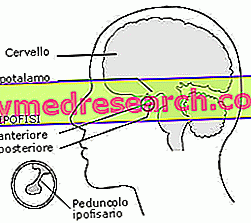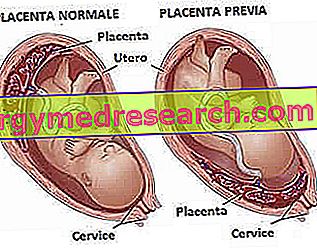Related articles: Pneumonia ab ingestis
Definition
Ab ingestis pneumonia is an inflammation of the lungs caused by the entry of foreign substances into the bronchopulmonary tree.
Various liquid or solid materials can be directly toxic to the airways; others are able to stimulate an inflammatory response when inhaled.
Gastric content is the most common aspirated substance capable of producing damage, mainly due to acidity, although food, rhino- and oropharyngeal secretions and other materials are harmful, if inhaled in large quantities.
Risk factors for ab ingestis pneumonia include all those pathological conditions that alter the state of consciousness or create swallowing dysfunctions, as seen in some patients with neurological deficits or dementia. Some gastro-intestinal and pulmonary medical devices (eg nasogastric tube and endotracheal tube) and gastroesophageal reflux disease are also increasing.
Most common symptoms and signs *
- Lowering of the voice
- Anorexia
- Arrhythmia
- Asthenia
- Chills
- Catarrh
- Cyanosis
- Dysphagia
- Dyspnoea
- Chest pain
- Muscle pains
- Edema
- hemoptysis
- Hemoptysis
- Pleural empyema
- Temperature
- Hypoxia
- Multiple pulmonary nodules
- Pallor
- Weight loss
- Hoarseness
- Wheezing breath
- Sense of suffocation
- Squeal
- Sweating
- Tachycardia
- tachypnoea
- Cough
- Pleural effusion
Further indications
Inhalation of foreign substances in the bronchopulmonary tree can cause inflammation of the lungs (chemical pneumonia), an infection (bacterial pneumonia and / or lung abscess) or an airway obstruction.
In general, ab ingestis pneumonia is manifested by the sudden appearance of respiratory difficulties (acute dyspnea) and cough, associated with the ingestion of solid or liquid food or regurgitation of gastric contents. The severity of the symptoms is related to the nature and quantity of the material aspirated.
In some cases, the cough is associated with the production of a pinkish and foamy or purulent sputum. After swallowing, in the case of pneumonia ab ingestis it is possible to find a change in the voice (such as hoarseness or gurgle in the throat). Other symptoms include tachycardia, high respiratory rate, fever, fatigue, myalgia, weight loss and general malaise. Ab ingestis pneumonia can also lead to diffuse and wheezing expiratory, cyanosis, hypoxemia, pleuritic chest pain, bronchoconstriction and acute pulmonary edema.
Ab ingestis pneumonia is usually diagnosed by clinical evaluation, microbiological cultures and chest radiography. This last investigation can demonstrate the presence of widespread densities.
Prognosis and treatment vary depending on the substance inhaled. Ab ingestis pneumonia may resolve spontaneously within a few days or may develop into respiratory distress syndrome. Often, patient management involves mechanical ventilation and supplemental oxygen delivery. Antibiotics are expected in case of inhalation of ascertained or suspected gastric contents.



